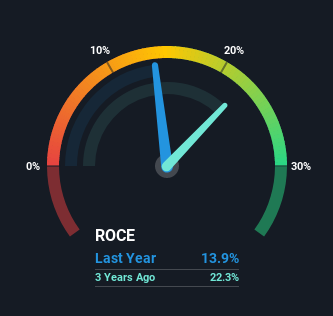There Are Reasons To Feel Uneasy About Worth Peripherals' (NSE:WORTH) Returns On Capital
If we want to find a potential multi-bagger, often there are underlying trends that can provide clues. Typically, we'll want to notice a trend of growing return on capital employed (ROCE) and alongside that, an expanding base of capital employed. Ultimately, this demonstrates that it's a business that is reinvesting profits at increasing rates of return. However, after briefly looking over the numbers, we don't think Worth Peripherals (NSE:WORTH) has the makings of a multi-bagger going forward, but let's have a look at why that may be.
What is Return On Capital Employed (ROCE)?
If you haven't worked with ROCE before, it measures the 'return' (pre-tax profit) a company generates from capital employed in its business. The formula for this calculation on Worth Peripherals is:
Return on Capital Employed = Earnings Before Interest and Tax (EBIT) ÷ (Total Assets - Current Liabilities)
0.14 = ₹209m ÷ (₹1.7b - ₹192m) (Based on the trailing twelve months to December 2021).
Thus, Worth Peripherals has an ROCE of 14%. That's a relatively normal return on capital, and it's around the 15% generated by the Packaging industry.
View our latest analysis for Worth Peripherals

While the past is not representative of the future, it can be helpful to know how a company has performed historically, which is why we have this chart above. If you'd like to look at how Worth Peripherals has performed in the past in other metrics, you can view this free graph of past earnings, revenue and cash flow.
What Can We Tell From Worth Peripherals' ROCE Trend?
On the surface, the trend of ROCE at Worth Peripherals doesn't inspire confidence. Around five years ago the returns on capital were 21%, but since then they've fallen to 14%. However, given capital employed and revenue have both increased it appears that the business is currently pursuing growth, at the consequence of short term returns. And if the increased capital generates additional returns, the business, and thus shareholders, will benefit in the long run.
On a side note, Worth Peripherals has done well to pay down its current liabilities to 11% of total assets. That could partly explain why the ROCE has dropped. What's more, this can reduce some aspects of risk to the business because now the company's suppliers or short-term creditors are funding less of its operations. Some would claim this reduces the business' efficiency at generating ROCE since it is now funding more of the operations with its own money.
In Conclusion...
In summary, despite lower returns in the short term, we're encouraged to see that Worth Peripherals is reinvesting for growth and has higher sales as a result. Furthermore the stock has climbed 78% over the last three years, it would appear that investors are upbeat about the future. So while investors seem to be recognizing these promising trends, we would look further into this stock to make sure the other metrics justify the positive view.
Like most companies, Worth Peripherals does come with some risks, and we've found 2 warning signs that you should be aware of.
If you want to search for solid companies with great earnings, check out this free list of companies with good balance sheets and impressive returns on equity.
Valuation is complex, but we're here to simplify it.
Discover if Worth Peripherals might be undervalued or overvalued with our detailed analysis, featuring fair value estimates, potential risks, dividends, insider trades, and its financial condition.
Access Free AnalysisHave feedback on this article? Concerned about the content? Get in touch with us directly. Alternatively, email editorial-team (at) simplywallst.com.
This article by Simply Wall St is general in nature. We provide commentary based on historical data and analyst forecasts only using an unbiased methodology and our articles are not intended to be financial advice. It does not constitute a recommendation to buy or sell any stock, and does not take account of your objectives, or your financial situation. We aim to bring you long-term focused analysis driven by fundamental data. Note that our analysis may not factor in the latest price-sensitive company announcements or qualitative material. Simply Wall St has no position in any stocks mentioned.
About NSEI:WORTHPERI
Worth Peripherals
Manufactures and sells corrugated boxes and sheets in India.
Flawless balance sheet with slight risk.
Similar Companies
Market Insights
Community Narratives



